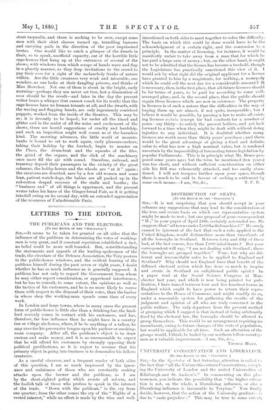LETTERS TO THE EDITOR.
'THE PUBLICANS AND THE ELECTORS. (To THE EDITOR OF TILE "SPECTATOR,'] SIR,—It seems to be taken for granted on all sides that the influence of the publican in determining the votes of working- men is very great, and if constant repetition established a fact, no belief could be more well founded. But, notwithstanding the statements and appeals of the leading spokesmen of the trade, the circulars of the Defence Association, the Tory posters in the public-house windows, and the evident leaning of the publican himself during the past seven or eight years, I doubt whether he has so much influence as is generally supposed. A publican has not only to regard the Government from whom he may either expect consideration, or apprehend interference, but he has to consult, to some extent, the opinions as well as the tactics of his customers, and he is no more likely to coerce them with respect to the disposal of their votes, than the barber in whose shop the working-man spends some time of every week.
In London and large towns, where in many cases the present form of public-house is little else than a drinking-bar, the land- lord scarcely comes in contact with his customers, and has, therefore, far less influence than he might have in a country inn or village ale-house, where, if he be anything of a talker, he nlay exercise his persuasive tongue upon his parlour or smoking- room company. After all, the publican's object is to draw custom and make money, and it is as unreasonable to expect that he will offend his customers by strongly opposing their political predilections, as it is unjust to assume that his primary object in going into business is to demoralise his fellow- creatures.
As a careful observer, and a frequent reader of both sides of this question, I am as much impressed by the ignor- ance and unfairness of those who are constantly making attacks upon the brewer and the publican, as I am by the short-sighted policy which resists all reform, and 'the foolish talk of those who profess to speak in the interest of the trade. "Down with the publican," is the cry from one quarter ; from the other comes the cry of the" Rights of a vested interest," while no effort is made by the wise and well- intentioned on both sides to meet together to solve the difficulty. The basis on which this could be done would have to be the acknowledgment of a certain right, and the concession to a principle. In the matter of licensing, for instance, it would be manifestly unfair to take away from a man that for which be has paid a large sum of money ; but, on the other hand, it ought not to be admitted that the licence has become a freehold, though the Legislature has practically sanctioned this view of it. I would ask by what right did the original applicant for a licence have granted to him by a magistrate, for nothing, a monopoly which be could sell the next day for a considerable amount ? It is necessary, then, in the first place, that all future licences should be for terms of years, to be paid for according to some well- arranged plan ; and, in the second place, that the public should regain those licences which are now in existence. The property in licences is of such a nature that the difficulties in the way of buying them up are almost, if not quite, insuperable ; but I believe it would be possible, by passing a law to make all exist- ing licences certaim (except for bad conduct) for a number of years—say thirty—to satisfy the present holders, and yet look forward to a time when they might be dealt with without doing injustice to any individual. It is doubtful whether many licences are worth more than thirty years' purchase ; and there would be the great advantage of giving a fixed and definite value to what has now a high nominal value, but is rendered. uncertain by the impossibility of forecasting future legislation by popular Parliaments. This is in principle what Mr. Bruce pro- posed some years ago ; but the term he mentioned (ten years) was too short, and without sufficient consideration on either side his Bill was vehemently attacked, and too easily aban- doned. I will not trespass further upon your space, though there is much to be said in favour of seeking a settlement by
some such means.—I am, Sir, &c., T. F. EL


































 Previous page
Previous page